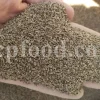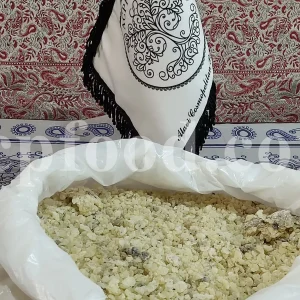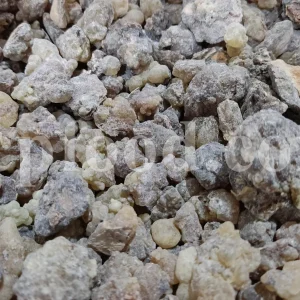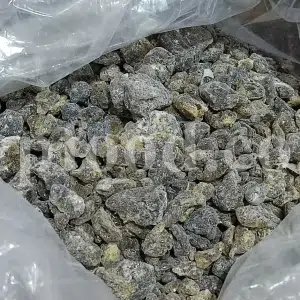GENERAL DATA
Plant Parts: Seeds, Seed oil, Resin
Cultivation mode: Wild Collection/Cultivated
In manufacturing: Pharmaceutical, confectionary, spices, perfumery, soap, toothpaste, pesticide, oil, beverages.
In food: Herbal Tea, Spice
🌿 Industries That Use Ajwain Seed (Trachyspermum ammi L.)
Here’s a well-organized list of industries that commonly use Ajwain Seed from Trachyspermum ammi (commonly known as Carom Seed or Bishop’s Weed):
🌱 What Is Ajwain?
Ajwain seed, also known as carom seed, is the dried fruit (often called a “seed”) of Trachyspermum ammi, a herbaceous plant in the Apiaceae family, native to South Asia and the Eastern Mediterranean. These small, oval, grayish seeds have a strong thyme-like aroma due to high levels of thymol.
Ajwain seed is revered in Ayurveda, Unani, and culinary traditions for its carminative, antispasmodic, antimicrobial, and digestive stimulant properties.
1. Pharmaceutical & Traditional Medicine Industry
Ajwain seed is considered a potent digestive and respiratory aid in multiple traditional systems.
Medicinal Applications:
-
Digestive stimulant: used in flatulence, bloating, indigestion
-
Antispasmodic: relieves stomach cramps and colic
-
Cough and cold remedy: expectorant and bronchodilator properties
-
Antiparasitic: used in expelling intestinal worms
✅ Common forms: Ajwain churna (powder), herbal tablets, decoction, and essential oil
✅ Featured in classical formulations such as Ajmodadi churna, Hingwashtak churna, and Arq-e-Ajwain
2. Food & Culinary Industry
Ajwain is a key spice in Indian, Iranian, Middle Eastern, and North African cuisines, valued for its intense flavor and digestive benefits.
Culinary Uses:
-
Used in flatbreads (paratha, naan), lentil dishes, and pickles
-
Added to savory snacks, spice blends, and fermented foods
-
Also used to flavor vegetables, pulses, and chutneys
✅ Frequently paired with Cumin, Fennel, and Black seed
3. Nutraceutical & Functional Foods Industry
Ajwain is incorporated into digestive supplements, metabolism boosters, and immune support formulas.
Nutraceutical Applications:
-
Capsules for acid reflux and bloating
-
Teas for gut motility and cold relief
-
Combined with Rock Salt or Black Pepper in digestive blends
✅ Contains thymol, a monoterpene with antiseptic and antifungal properties
4. Essential Oil & Aromatherapy Industry
Ajwain seeds are steam-distilled to extract ajwain essential oil, rich in thymol, and used in topical and respiratory therapies.
Applications:
-
Thymol oil used in antiseptic and pain-relief balms
-
Aromatherapy oil for nasal decongestion and respiratory ease
-
Ingredient in natural disinfectants, herbal vapor rubs, and lotions
✅ Used externally in diluted form due to strong potency
5. Cosmetic & Personal Care Industry
Ajwain extracts are sometimes used in anti-acne, anti-dandruff, and skin-purifying products.
Applications:
-
Included in herbal facial masks and cleansing tonics
-
Used in scalp treatments for fungal and microbial issues
-
Employed in foot creams and antiseptic lotions
✅ Beneficial for oily or blemish-prone skin types
6. Veterinary & Livestock Care
Ajwain is used traditionally in livestock medicine to treat bloating, parasites, and digestive infections in cattle and goats.
Veterinary Uses:
-
Given in powder or decoction form to ruminants
✅ Recognized in traditional animal husbandry in India, Pakistan, and Iran
7. Ethnic, Organic & Export Markets
Ajwain seeds are exported globally as a culinary spice, digestive herb, and essential oil source.
Export Forms:
-
Whole seeds (bulk or packaged)
-
Ground powder (churna)
-
Ajwain essential oil (for pharmaceutical or cosmetic use)
✅ In demand across Ayurvedic, organic, halal, and ethnic food sectors
8. Scientific & Phytochemical Research
Ajwain is being researched for its bioactive compounds, especially thymol, carvacrol, and p-cymene.
Research Focus:
-
Gastroprotective and carminative effects
-
Antimicrobial and antifungal properties
-
Analgesic, anti-inflammatory, and bronchodilatory effects
-
Use of ajwain oil as a natural preservative or biopesticide
✅ Seen as a natural alternative to synthetic antimicrobials in food and pharma
✅ Summary of Key Applications
| Industry | Common Uses |
|---|---|
| Pharmaceutical & Traditional | Indigestion, gas, cough, parasitic infection, colic |
| Food & Culinary | Spice for flatbreads, lentils, pickles, savory snacks |
| Nutraceutical & Functional | Gut health supplements, metabolism teas, digestion boosters |
| Essential Oil & Aromatherapy | Thymol-rich oil for respiratory relief and topical antiseptics |
| Cosmetic & Skincare | Herbal cleansers, anti-acne masks, scalp purifiers |
| Veterinary | Digestive and antiparasitic agent for ruminants |
| Export & Ethnic Markets | Bulk spice, digestive herb, essential oil |
| Scientific Research | Antimicrobial, carminative, antifungal, and bronchodilator studies |
🌟 Key Features
-
Rich in thymol, a strong antiseptic and digestive stimulant
-
Dual-purpose: culinary spice and medicinal herb
-
Widely used in Ayurveda, Unani, and traditional Persian systems
-
Supports gut, lung, and skin health
-
Gaining recognition in phytomedicine and food technology sectors
🧪 Industries That Use “Sat Ajwain” (Thymol Crystal)
Derived from Trachyspermum ammi (Ajwain)
🌿 What Is Sat Ajwain?
Sat Ajwain refers to the crystalline form of thymol, the primary bioactive compound found in Ajwain seeds. It is extracted via steam distillation of Trachyspermum ammi and subsequently crystallized.
The resulting thymol crystal is a colorless to white crystalline solid with a strong aromatic, medicinal scent, known for its antimicrobial, antifungal, anesthetic, and antispasmodic actions.
Sat Ajwain (thymol) is widely used in pharmaceutical, food, dental, veterinary, and cosmetic industries.
1. Pharmaceutical & Traditional Medicine Industry
Sat Ajwain is a recognized therapeutic agent used for a range of digestive, respiratory, and infectious conditions.
Medicinal Applications:
-
Antiseptic and antibacterial agent in internal and topical applications
-
Anesthetic and analgesic for mild toothache and oral inflammation
-
Used for flatulence, indigestion, and abdominal cramps
-
Acts as a bronchodilator and expectorant in cough remedies
✅ Often used in digestive tonics, mouthwashes, throat sprays, and pain-relief balms
✅ Found in Ayurvedic, Unani, and herbal preparations
2. Dental & Oral Care Industry
Thymol crystals are commonly used in toothpastes, mouthwashes, and gum pain relievers for their antibacterial and numbing properties.
Applications:
-
Toothache relief (applied directly or infused in oil)
-
Ingredient in oral antiseptics, lozenges, and gargles
-
Fights bad breath, oral ulcers, and gingivitis
✅ Also used in combination with clove oil or camphor for oral hygiene products
3. Food Preservation & Flavoring Industry
Though very strong, thymol is used in tiny concentrations in food safety applications and traditional spice extracts.
Food Applications:
-
Acts as a natural food preservative due to strong antimicrobial action
-
Sometimes used to flavor digestive tablets, bitters, or syrups
-
Has GRAS (Generally Recognized As Safe) status in regulated doses
✅ May also be used in biopreservative coatings for produce or dried goods
4. Veterinary Medicine & Animal Husbandry
Sat Ajwain is employed in natural veterinary formulations, particularly for intestinal worms, infections, and bloating in livestock.
Applications:
-
Part of herbal worming formulations
-
Mixed in oils for external application on infected skin
-
Used in disinfectant washes for stables or animal wounds
✅ Requires dilution and expert handling due to potency
5. Cosmetic & Skincare Industry
Thymol crystals are used in formulations targeting acne, dandruff, and skin irritation due to their antiseptic and antifungal effects.
Uses:
-
Active in anti-acne creams, herbal spot gels, and cleansers
-
Used in scalp tonics and anti-dandruff shampoos
-
Added to natural deodorants and foot sprays
✅ Popular in Ayurvedic and herbal skincare sectors
6. Aromatherapy & Natural Disinfectant Products
Because of its sharp scent and disinfecting action, thymol is used in inhalant vapors, disinfectants, and herbal steam blends.
Applications:
-
Included in steam inhalation blends for nasal congestion
-
Mixed in disinfectant surface sprays and cleaning products
-
Used in aromatherapeutic muscle rubs
✅ Blends well with eucalyptus, menthol, or camphor
7. Scientific & Botanical Research
Research supports thymol’s role in broad-spectrum antimicrobial action, biofilm disruption, and natural biocidal potential.
Studied for:
-
Antibacterial and antifungal mechanisms
-
Role in preservative-free formulations
-
Application in oral care and skin microbiome modulation
-
Alternative to synthetic antimicrobials in pharma and food
✅ Also researched in nanotechnology for use in drug delivery systems
✅ Summary of Key Applications
| Industry | Common Uses |
|---|---|
| Pharmaceutical & Herbal | Antispasmodic, toothache remedy, antiseptic |
| Dental & Oral Care | Tooth powders, mouthwashes, anti-gingivitis gels |
| Food Industry | Digestive extracts, natural preservatives, herbal bitters |
| Veterinary | Deworming powders, antiseptic ointments, stable disinfectants |
| Cosmetic & Skincare | Acne gels, scalp tonics, antifungal creams |
| Disinfectants & Aromatherapy | Vapor inhalants, disinfecting sprays, steam blends |
| Scientific Research | Natural antimicrobial, biofilm inhibitor, preservative alternative |
🌟 Key Features
-
Pure crystalline thymol from Ajwain distillation
-
Powerful antiseptic, carminative, antifungal, and analgesic
-
Requires dilution before topical or internal use
-
Used in oral care, respiratory blends, cosmetic gels, and natural cleaning agents
-
A cornerstone extract in many Ayurvedic and Unani systems
🌿🧪 Comparison Table: Ajwain Seed vs. Sat Ajwain (Thymol Crystal)
Derived from Trachyspermum ammi L.
| Aspect | Ajwain Seed (Whole Fruit) | Sat Ajwain (Thymol Crystal) (Isolated Compound) |
|---|---|---|
| Form | Small, oval, grayish-brown seeds (technically fruits) | White to colorless crystalline solid |
| Source | Harvested and dried whole fruits of the Ajwain plant | Extracted via steam distillation and crystallization from Ajwain essential oil |
| Primary Compound | Contains thymol, terpenes, flavonoids, fiber | Pure thymol (usually 98%+ purity) |
| Flavor & Aroma | Strong, sharp, thyme-like, bitter-spicy | Intensely pungent and medicinal (similar to phenol or menthol) |
| Usage in Traditional Medicine | Used whole or ground for digestion, gas, colic, respiratory and parasitic issues | Used externally or in diluted forms for antiseptic, decongestant, and anesthetic effects |
| Pharmaceutical Use | Carminative, antispasmodic, expectorant | Topical antiseptic, toothache reliever, cough vapor ingredient |
| Culinary Use | Widely used in Indian, Persian, and Middle Eastern cooking | Not used directly due to strong taste and potential toxicity in high doses |
| Nutraceutical Use | Formulated in digestion capsules, teas, and metabolic blends | Used sparingly in medicinal syrups, balms, or vapor rubs |
| Cosmetic/Skincare Use | Rarely used directly in skincare | Active in acne creams, scalp treatments, deodorants, foot sprays |
| Aromatherapy & Disinfection | Minimal direct use; seeds may be added to steam inhalation | Used in vaporizers, steam blends, and herbal disinfectants |
| Veterinary Use | Used in powdered form for livestock digestion and parasite control | Used in disinfectants and worming solutions for animals (external or diluted internal use) |
| Market Form | Whole seeds, ground powder (churna), oil-infused preparations | Crystalline powder, oil-soluble ingredient, topical formulations |
| Export Category | Culinary spice, digestive herb, essential oil raw material | Botanical isolate, pharmaceutical-grade antiseptic additive |
✅ Summary Snapshot
| Feature | Ajwain Seed | Sat Ajwain (Thymol) |
|---|---|---|
| Natural State | Whole herb | Isolated active compound |
| Edibility | Edible | Not edible in raw form |
| Main Use | Culinary + Herbal Medicine | Pharmaceutical + Cosmetic |
| Potency | Moderate | Highly concentrated |
| Need for Dilution | No | Yes, essential |
🌟 Final Notes:
-
Ajwain seed is versatile and used widely in food, traditional medicine, and mild wellness products.
-
Sat Ajwain is a powerful isolate that must be handled carefully but is highly effective in antimicrobial, analgesic, and respiratory applications.
PRODUCT NAME IN DIFFERENT LANGUAGES
Persian Name: زنیان/ Zeniyan
German Name (Deutschland, Austria, Switzerland): Ajowan, Königskümmel
French Name (France, Belgium, Switzerland, Quebec): Ajowan en graines
HARVEST CALENDAR
Feb
Mar
Apr
May
Jun
Jul
Aug
Sep
Oct
Nov
Dec
To order Carom seeds, please contact us.
About Trachyspermum Ammi
Ajwain is the seed of an annual plant whose height reaches one meter. This plant has many thin stems whose cross section is circular. The leaves are very small, thin, cut and needle-shaped. The flowers of Ammi plant are white and very small and grow in the form of an umbrella and a set at the end of the flowering stems. Each flower has five heart-shaped petals, very small and completely separated.
The seeds of the female plant are brown, very small, pointed, slightly elongated, oval, and crescent-shaped, and almost similar to the seeds of the Anise plant. On the surface of each seed, there are five longitudinal, parallel, thin, yellow ridges. The aroma of Ajwain seed are strong and fragrant, and its taste is spicy and slightly bitter.
The best Carom seeds have a yellow and reddish color and a strong taste and aroma.
Ajwain seed expels excess moisture and pus. It removes the effects of toxic spices and strong laxatives. It prevents the food to get rotten in the stomach, removes moisture and cold from the liver, stomach, and intestines. It also improves paralysis, tremors, chest pain, heart palpitations, liver and spleen stiffness, cramps, hiccups, vomiting, nausea, bad smelling burps, indigestion, borborygmus, chronic cold fevers.
Eating Carom seeds repels the harmful effects of Opium, helps to quit addiction, and heal animal and insect bites. Eating Ajowan seeds on empty stomach can break kidney and bladder stones and helps to treat polydipsia.
Eating Ajwain seed with honey and liquids removes stomach worms and joint worms. Relieves cold urinary retention.
Eating Ammi seeds with Sekanjebin is beneficial for those whose food is not delicious to their taste and warm temperament people and cures all uterine diseases.
If you soak Ajwain seed in Lime juice and dry it and repeat this seven times, eating it will increase sexual power.
Dripping Carom seeds drop (dense boiled decoction) in the eye expels the pus and infection frozen in the eye. Also, dripping this mixture into the ear helps to relieve the heaviness.
Poultice of Ajwain seeds with honey is useful for pain and swelling. This poultice with Salt, Lupine and saffron improves swelling of the testicles and ovaries. Ammi poultice with oil is useful for removing spots and moisture marks on the skin. This poultice with egg white treats swelling and protrusion of the navel.
Ajowan seed hydrosol expels excess moisture from the stomach and is useful for paralysis, tremors, nervous diseases, shortness of breath, ascites, and flatulence.
Carom seeds oil improves chronic pains and cold swellings.
Ajwain Seed Dose
Up to 5.30 grams.
Ajwain Seeds Side Effects
Carom seeds cause headache in hot temperament people. Excessive consumption of Ajwain leads to dark vision, yellowing of the body and reduction of milk and semen.
Ajwain Seed Modifiers
Coriander for headache, dark vision and jaundice.
To order Ajowan seed, please contact us.





























Reviews
There are no reviews yet.